Mastering the selection, maintenance, and timely replacement of RV tires greatly enhances safety and performance on long hauls. Always verify that tire pressure matches the manufacturer's recommendations to reduce wear and improve fuel efficiency. Regular assessments of tread depth and visual checks for signs of dry rot or damage are essential. Choose tires based on your RV's specific weight capacity and size requirements, considering factors like durability and heat dissipation. Preventive measures, such as using tire covers and avoiding overloading, extend tire life. Further exploration will reveal detailed insights into maximizing the longevity and safety of your RV tires.
Understanding RV Tire Basics
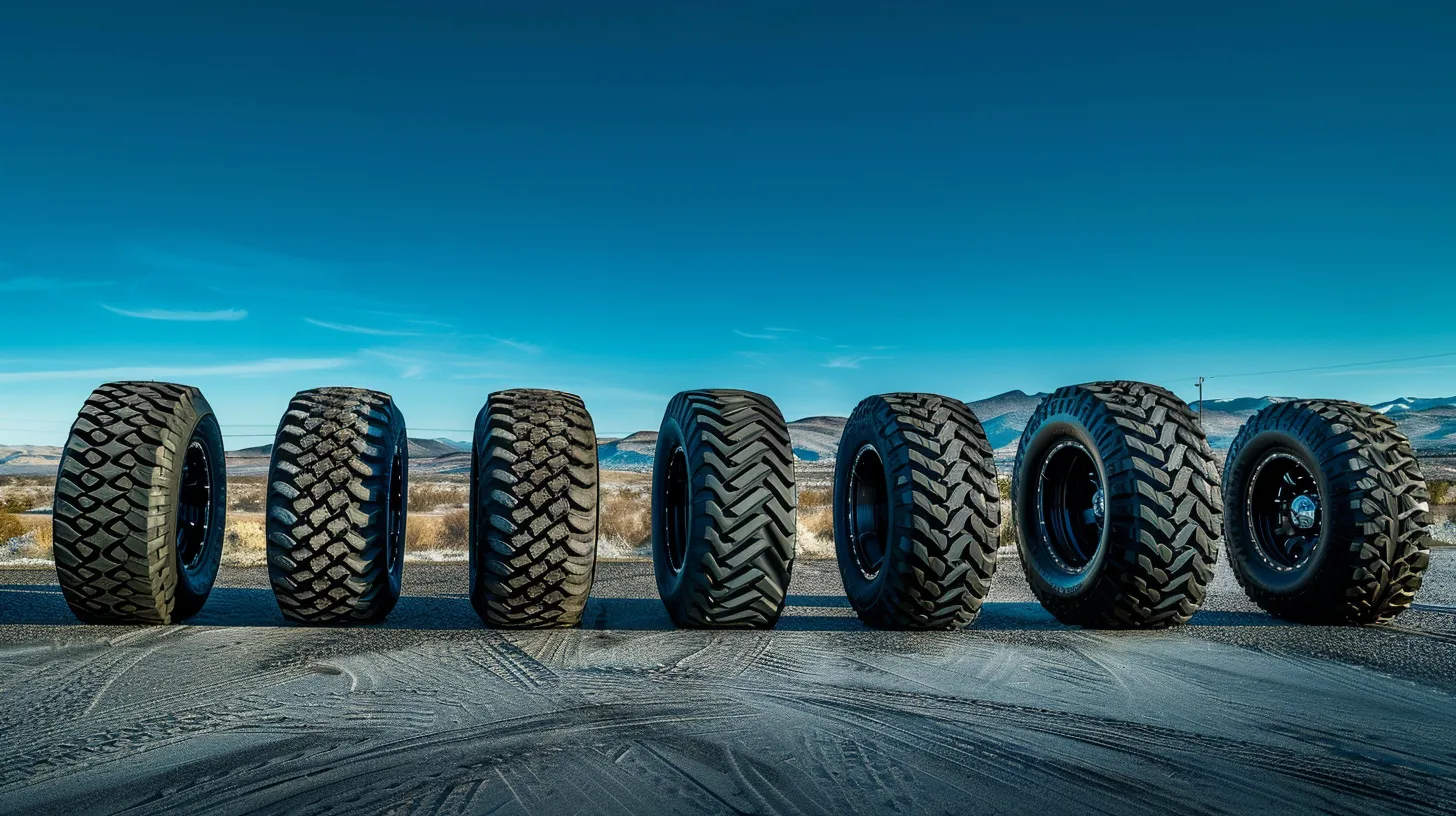
Understanding the basics of RV tires is essential for ensuring both the longevity of the tires and the safety of your travels. Tire pressure is a critical factor; incorrect pressure can lead to increased tire wear, reduced fuel efficiency, and even tire failure. It is important to check tire pressure regularly, especially before long trips, to ensure it aligns with the manufacturer's recommendations .
Tread depth is another significant aspect of tire maintenance. For safe operation, the minimum tread depth should be 4/32nd of an inch on front tires and 2/32nd of an inch on rear tires. Regularly checking the tread depth can help identify when tires need replacing and prevent hazardous driving conditions .
Dry rot is a common issue that affects the integrity and safety of RV tires. It is typically caused by prolonged exposure to sunlight and not maintaining proper tire inflation . Dry rot can lead to cracks in the tire sidewalls and tread, compromising the tire's structure and necessitating its replacement. To prevent dry rot, store your RV in shaded areas when possible and regularly inspect tires for any signs of aging or deterioration.
Selecting the Right RV Tires

Selecting the right RV tires requires careful consideration of weight capacities , speed ratings , and specific vehicle requirements to guarantee top performance and safety. When selecting the right tires, it is important to understand the distinct needs of your RV based on its class and intended use. For Class A and Class C motorhomes, which are typically larger and heavier, the tires must have a weight capacity that can support the substantial load of the vehicle along with its contents and passengers. This ensures safety and enhances the vehicle's handling and longevity.
Moreover, considering the speed ratings is essential, especially for those who travel long distances or at higher speeds. Radial tires are often recommended for RVs due to their durability and ability to handle higher speed ratings efficiently. These tires are designed to offer better heat dissipation and reduced rolling resistance, which is critical for maintaining stability and fuel efficiency during long trips.
Additionally, the size of the tires must be compatible with the RV to adequately handle its weight capacity. Oversized or undersized tires can lead to poor handling, increased wear and tear, and potential safety hazards. Always consult your RV manufacturer's guidelines or a tire professional to make the best choice for your specific vehicle needs.
Signs Your RV Tires Need Replacement
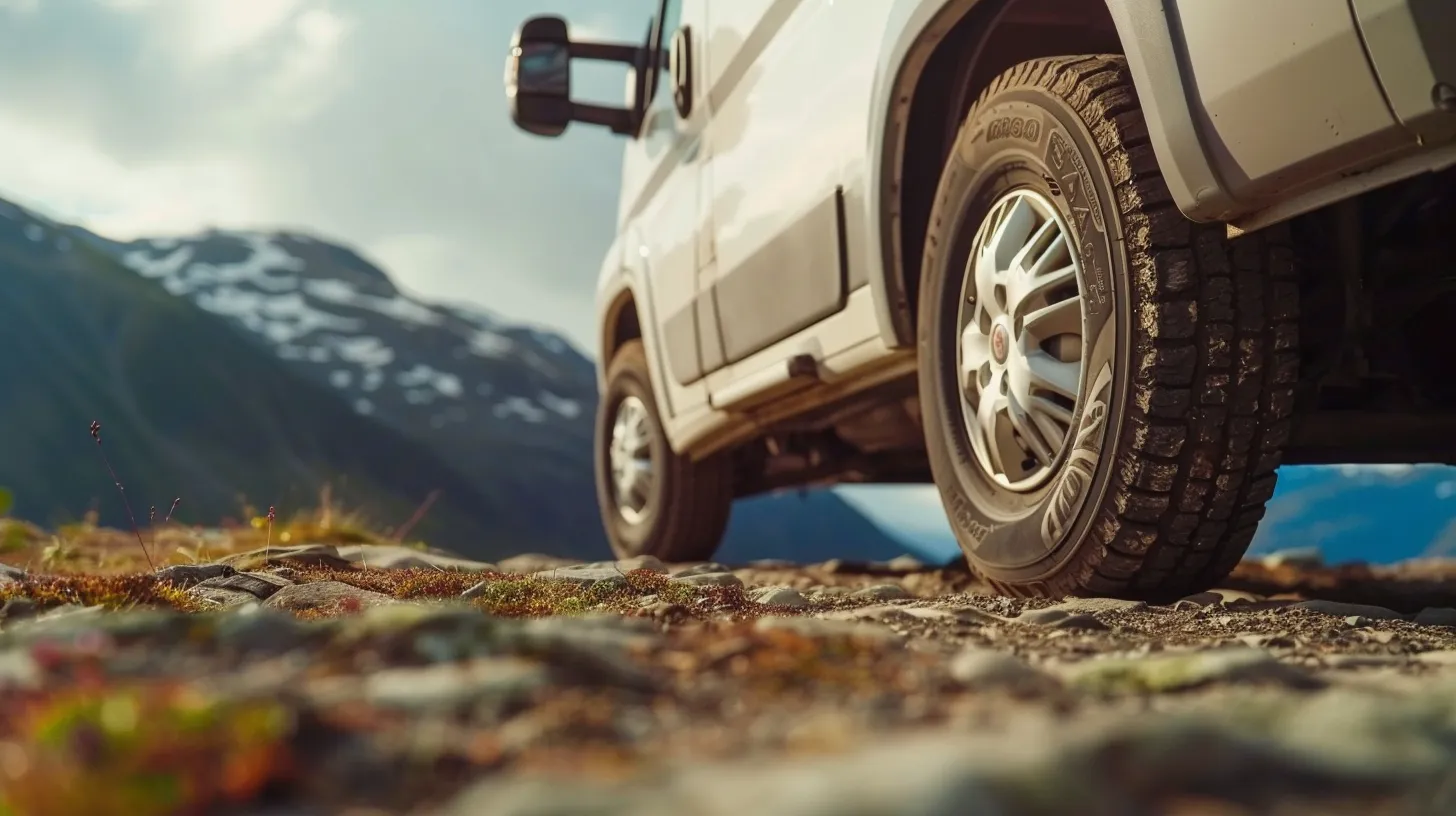
Regularly inspecting your RV tires is essential, as certain signs indicate the urgent need for replacement to guarantee safety and peak performance. Recognizing these signs early can prevent damage to your RV and make sure that your journeys remain safe. One critical indicator is the presence of bulges, cuts, or any irregularities on the tire surface. These flaws can result from rough roads or external debris and greatly compromise tire integrity .
Another sign that it might be time to replace your RV tires is the appearance of dry rot . This condition results from prolonged exposure to sunlight and not maintaining proper tire inflation . Dry rot can cause the tires to crack or weaken, posing serious risks during travel. Additionally, keep an eye on the tread depth . If the front tires display a tread depth less than 4/32nd of an inch, or the rear tires less than 2/32nd, replacement is necessary to maintain adequate traction and safety .
Lastly, uneven wear patterns or a significant loss of tread on your RV tires are strong indicators that they no longer provide the necessary stability or grip, making it important to replace them promptly to maintain your tires' performance and your RV's overall safety.
Routine RV Tire Maintenance
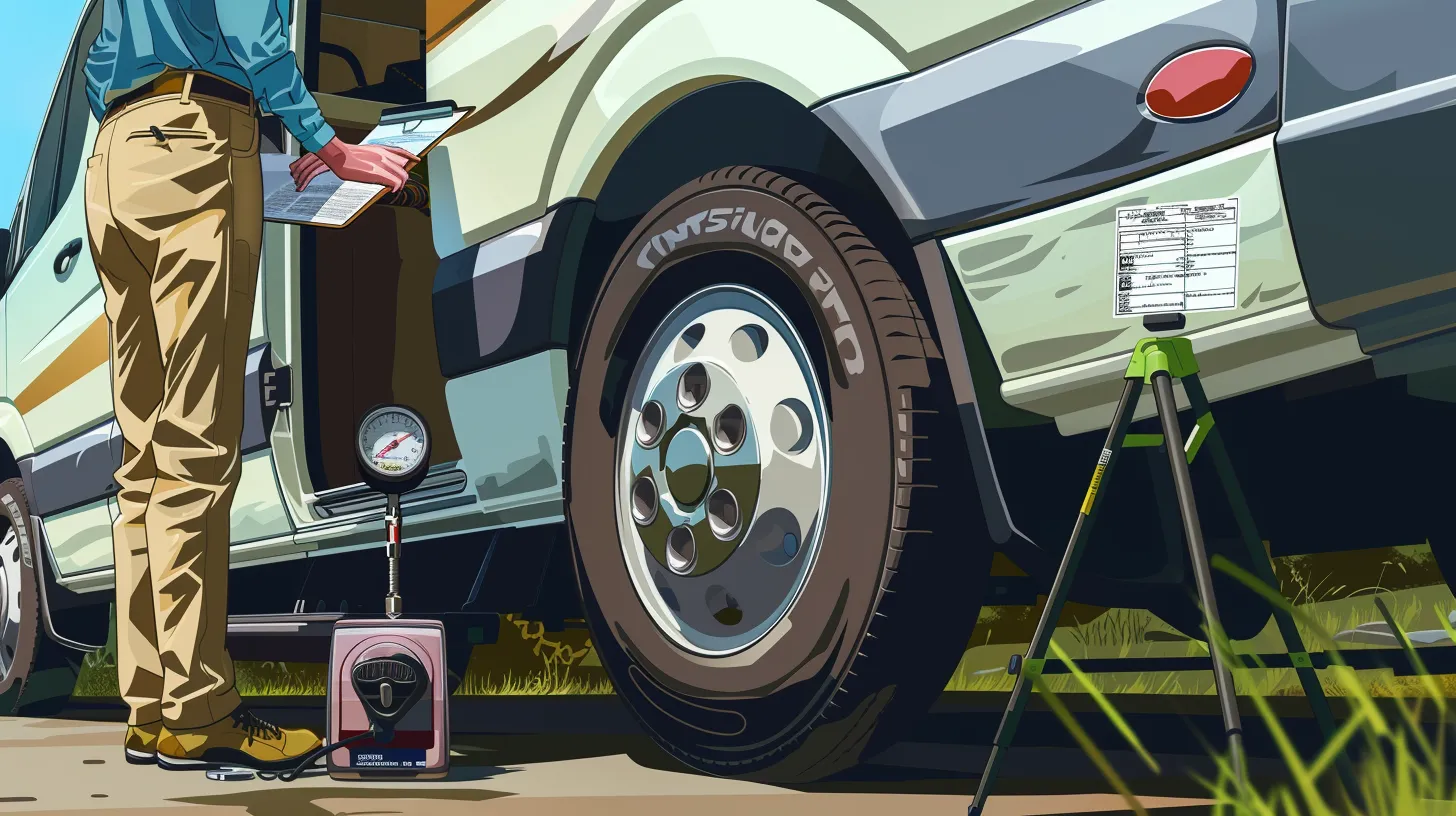
To guarantee the longevity and safety of your RV tires, it is essential to perform routine maintenance , including regular checks on tire pressure , tread depth , and overall condition. Maintaining the correct tire pressure is critical not only for best performance but also for fuel efficiency. It's recommended to check tire pressure before starting any trip, as fluctuations can occur due to changes in temperature and altitude.
Moreover, to ensure even wear and extend the life of your tires, it's advisable to rotate and balance them every 6,000-8,000 miles. Uneven tread wear can lead to decreased traction and increased risk of tire failure, particularly in adverse road conditions. Regular inspection for any visible signs of wear , such as cracks, bulges, and significant tread wear, is essential to identify potential issues early.
Additionally, keeping track of the manufacturing date of your tires is important. Tires have a lifespan, and even if they appear to be in good condition, old tires can pose a safety risk due to the degradation of rubber over time. Understanding when your tires were made helps in planning for timely replacements, ensuring continuous safety and performance on your travels.
Protecting RV Tires From Damage

Storing your RV in dry, cool conditions away from direct sunlight is essential to protect tires from damage and prolong their lifespan. Environmental elements, especially UV rays , can severely deteriorate the quality of rubber, leading to premature aging. To combat this, utilizing tire covers is a highly effective method. These covers serve as a barrier against harsh sunlight and adverse weather, preserving the tire's integrity and helping prevent the onset of dry rot and cracking .
Additionally, it's vital to regularly inspect tires for any signs of distress. Look for bulges, cuts, or embedded debris that could potentially puncture the tire. Also, pay attention to patterns of irregular wear , which often indicate deeper issues such as misalignment or imbalance. Addressing these signs early can prevent further damage and maintain tire performance.
Lastly, avoid tire overload at all costs. Overloading not only stresses the tire but also compromises its structure and safety. Adhering to the manufacturer's specified weight limits ensures that the tires are not subjected to undue stress, thereby aiding in their longevity and reliability during extensive travels. By following these guidelines, you can greatly enhance the durability and safety of your RV tires.
Tools and Products for Tire Care
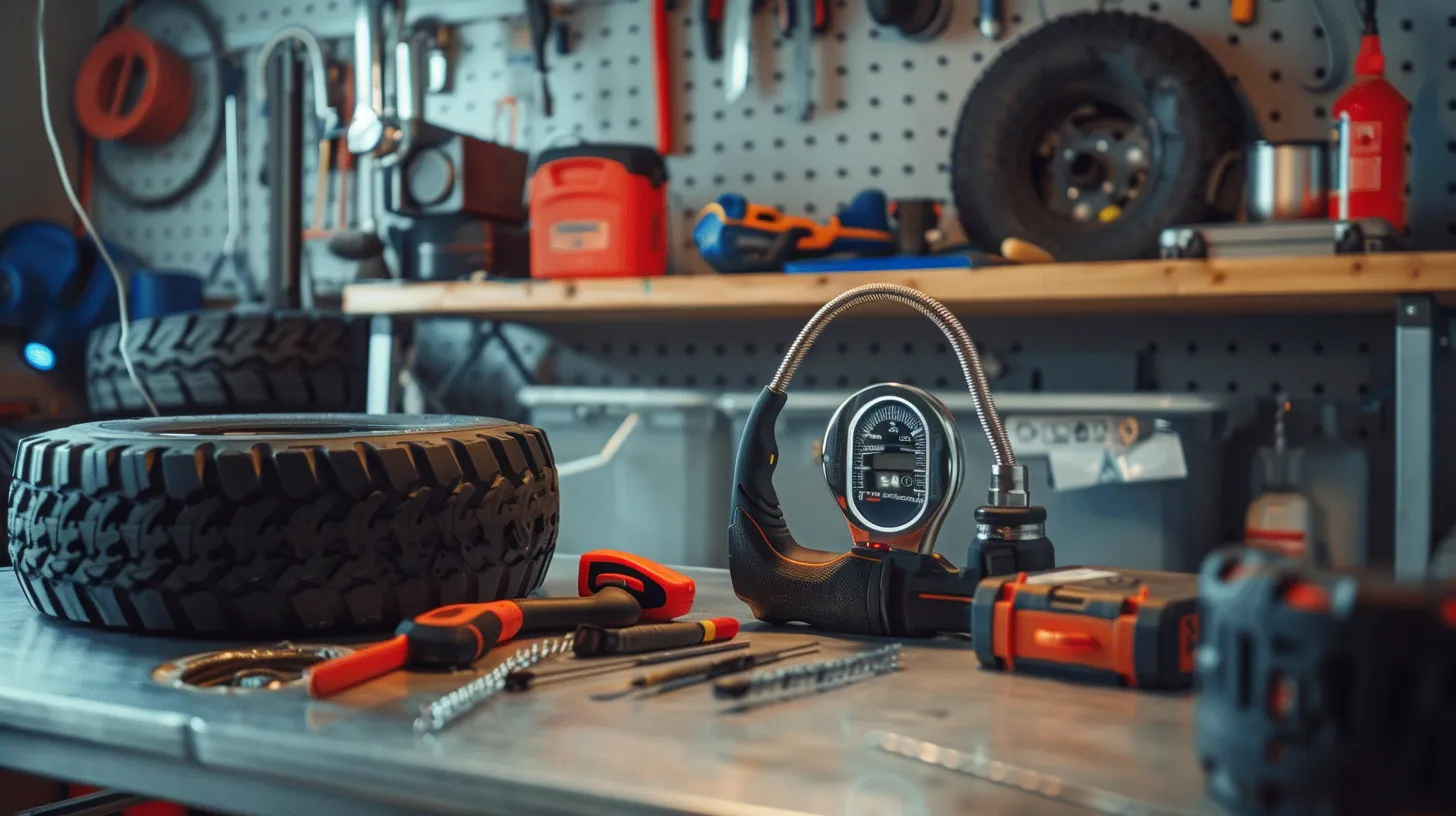
Maintaining peak tire condition requires specific tools and products designed for RV tire care. For effective tire maintenance, the Adco Tire Guards are essential. Available in model 39.66 , these guards fit 40-42 inch diameter RV tires and offer robust protection against water, dirt, and harmful UV rays during periods of storage and parking. Constructed from heavy-duty vinyl with double needle stitching, they guarantee durability and are easy to install with their elastic and Velcro straps.
For tire inflation, Portable Air Compressor Kits are indispensable. These kits feature a dual cylinder compressor capable of reaching up to 150 psi, complete with a coiled air hose and a hole repair kit. The convenience of a backlit LCD digital gauge with preset pressure shut-off and multiple power options, including a 12V source or battery terminals, makes this tool a must-have for regular tire maintenance tasks.
Additionally, cleaning and dressing RV tires correctly extends their life and enhances performance. It is recommended to use a soft bristle brush with RV-specific soap. For dressing, 303 Protectant offers a safe, water-based solution that not only protects RV tires from UV damage but also repels dirt without harmful petroleum distillates, alcohol, or silicone.
When to Replace RV Tires

While proper maintenance can extend the life of RV tires, it is important to recognize when they need to be replaced for safety and performance reasons. Regular visual inspections serve as a primary method to assess whether a tire needs replacement. Signs such as uneven tread wear , visible cracks , or bulges in the sidewall are clear indicators that the tires may no longer be safe for use. Additionally, if the tread depth is below the minimum legal requirement, it is time for the tires to be replaced to ensure top-notch traction and safety.
Aging factors also play a critical role in determining the lifespan of RV tires. Even if tires appear to be in good condition externally, internal damage could still compromise their integrity and safety. RV tires should typically be replaced every 5-7 years, regardless of their visual appearance. This proactive approach to replacing aging tires is vital to minimize the risk of blowouts and maintain high safety standards on the road. It is essential for RV owners to understand that while tires may not always show external signs of deterioration, the aging process can still render them unsafe for continued use.
RV Tire Service and Support
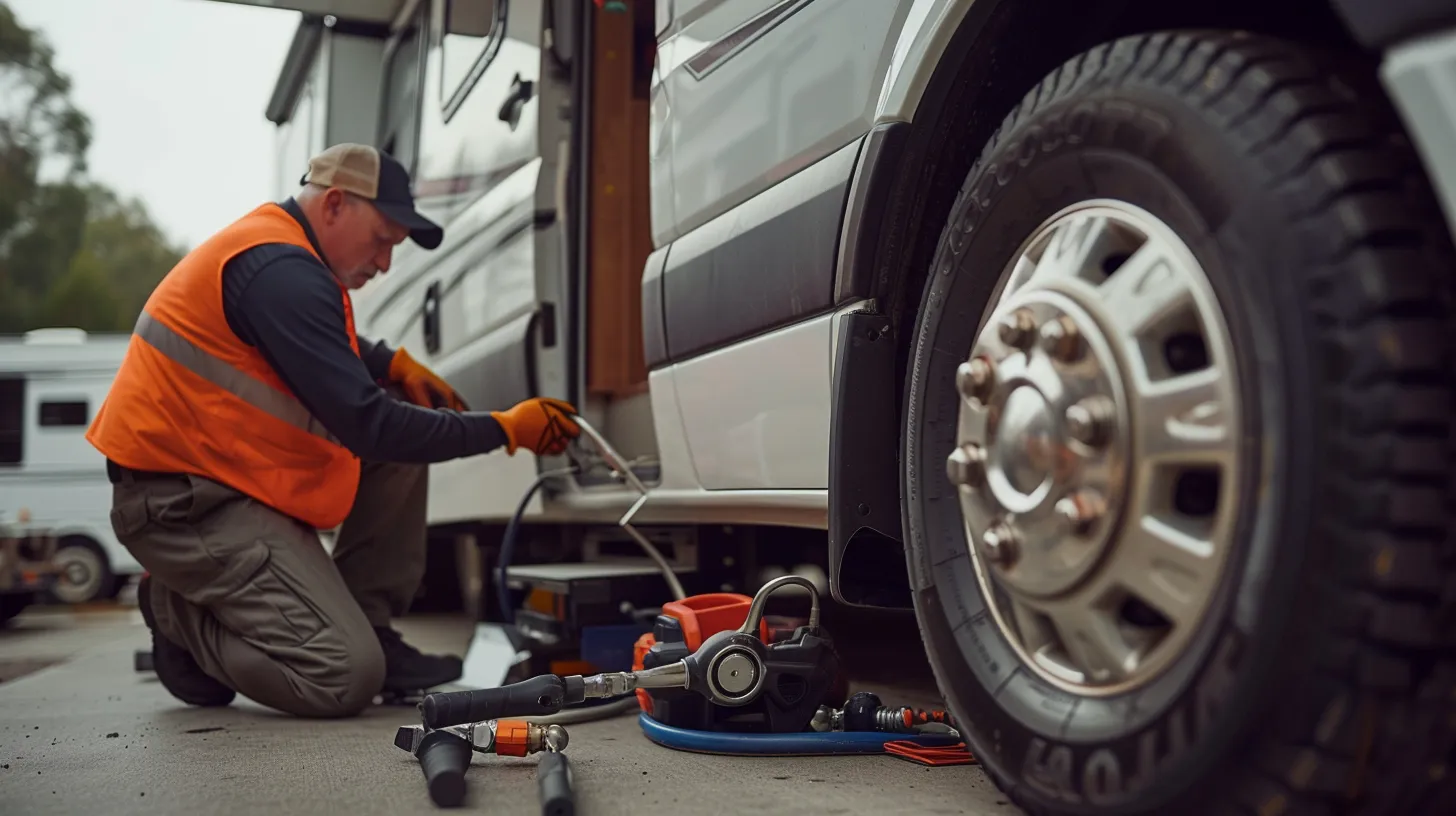
For RV owners seeking professional tire service and support, Wonderland Tire provides expert assistance across multiple locations in Michigan, Illinois, and Indiana. With 10 strategically placed facilities, they are well-equipped to handle the demands of various RV classes, including Class A, B, and C motorhomes. Their expert technicians are skilled in determining the perfect tire size and type based on specific RV requirements and prevailing road conditions.
Choosing the right new RV tires is vital for safety and performance, especially under varying road conditions. The team at Wonderland Tire excels in matching RVs with the best tires for their journey, ensuring that each vehicle is equipped to handle long distances and diverse terrains . They offer same-day service at certain locations, making it convenient for RV owners to receive quick and reliable tire support when needed.
The Michigan locations, including Howard City, Greenville, Holland, Zeeland, and Byron Center, provide accessible points of service for RV enthusiasts in the region. Whether it's replacing worn tires or performing routine maintenance , Wonderland Tire stands as a top choice for thorough RV tire service and support, ensuring your travels are both safe and enjoyable.










